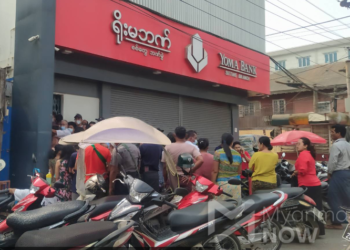The most eye-catching viral images of the 2021 Myanmar military coup come from a remarkable video where a fitness instructor performs a spirited exercise routine while, in the background, army vehicles are en route to surround the parliament complex. The surreal contrast between an everyday task and a brutal political takeover distils what’s at stake when a military junta comes to power. The mundanity of life would soon be gone, replaced by an endless parade of state violence and oppression.
Made by a group of anonymous film-makers, Berlin prize winner Myanmar Diaries begins with this famous video, threading together civilian footage of military brutality with staged, fictionalised sequences based on real-life stories. Vertically shot on smartphones by those on the frontline, these guerrilla recordings capture a collective resistance to the stripping back of individual rights. To witness an older woman bravely berating a convoy of young soldiers for terrorising protesters, or a mother being dragged out of her home by military personnel, is gut-punching. Enfolded in a disorientating cacophony of gunshots and screams, every frame shakes with the barbarity visited on dissenting citizens, whose plight seems to have been forgotten by international media.
While the film’s vérité elements thrust us into the heart of the conflict, the staged segments have a visual stillness steeped in tragedy. Faces of the actors are deliberately obscured, and so the trauma of broken relationships, persecution and self-harm is expressed metaphorically, for instance with recurring images of a man with a plastic bag over his face or little ants scurrying together in groups like tiny soldiers. Instead of dwelling on scenes of atrocities, the allegorical approach gets at the fundamental loneliness of living under a dictatorship.
I hope you appreciated this article. Before you move on, I was hoping you would consider taking the step of supporting the Guardian’s journalism.
From Elon Musk to Rupert Murdoch, a small number of billionaire owners have a powerful hold on so much of the information that reaches the public about what’s happening in the world. The Guardian is different. We have no billionaire owner or shareholders to consider. Our journalism is produced to serve the public interest – not profit motives.
And we avoid the trap that befalls much US media – the tendency, born of a desire to please all sides, to engage in false equivalence in the name of neutrality. While fairness guides everything we do, we know there is a right and a wrong position in the fight against racism and for reproductive justice. When we report on issues like the climate crisis, we’re not afraid to name who is responsible. And as a global news organization, we’re able to provide a fresh, outsider perspective on US politics – one so often missing from the insular American media bubble.
Around the world, readers can access the Guardian’s paywall-free journalism because of our unique reader-supported model. That’s because of people like you. Our readers keep us independent, beholden to no outside influence and accessible to everyone – whether they can afford to pay for news, or not.
Source – The Guardian






